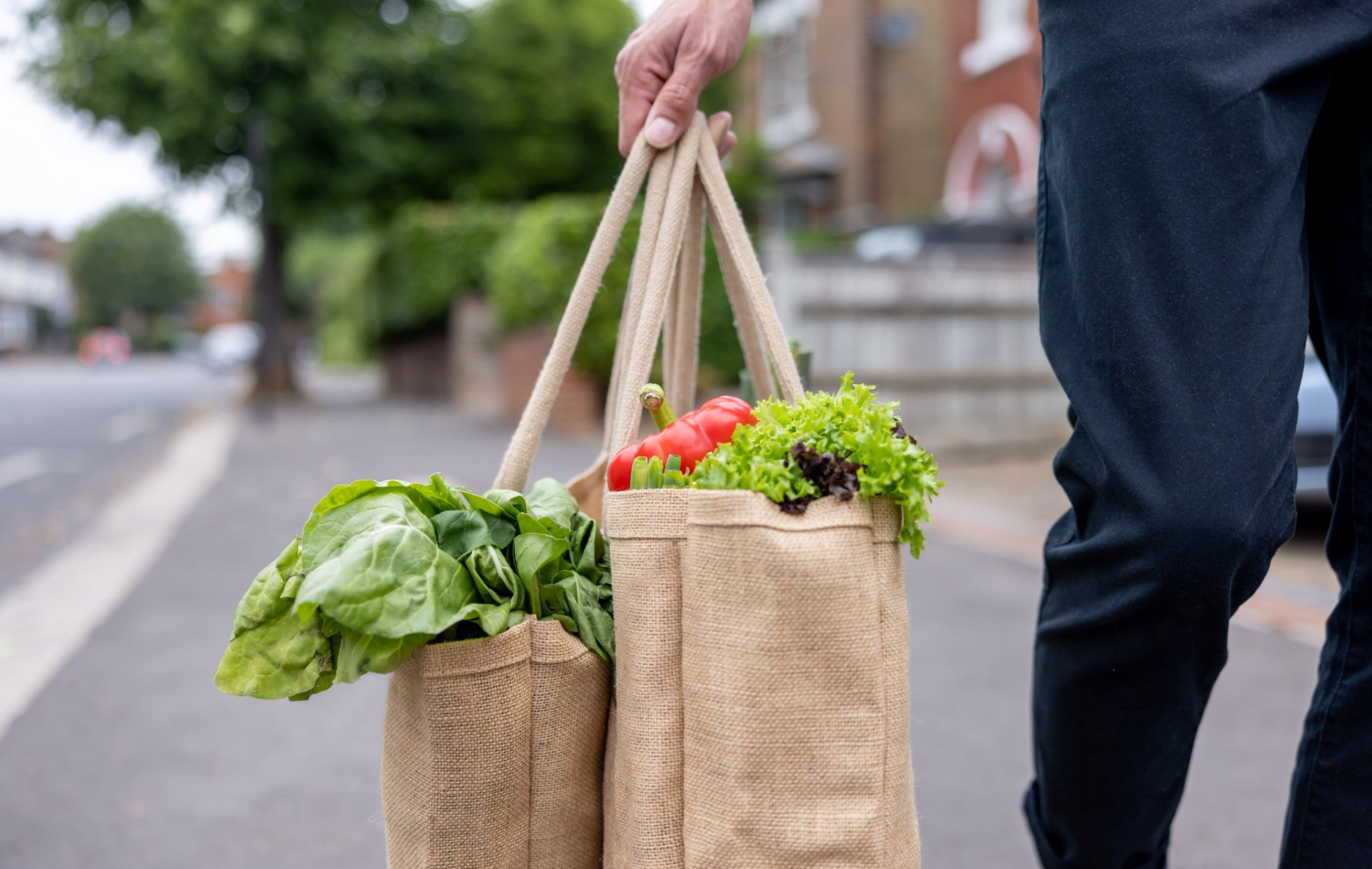Omdat milieubewustzijn voorop staat, is duurzaam winkelen uitgegroeid tot een belangrijk aspect van het verkleinen van onze ecologische voetafdruk. Een impactvol gebied om op te focussen is afvalvrij boodschappen doen.
Deze aanpak houdt in dat je bewuste keuzes maakt om verpakkingen en afval te minimaliseren bij de aankoop van voedsel en huishoudelijke artikelen. In deze gids verkennen we de principes van afvalvrij boodschappen doen en geven we inzicht in de voordelen, praktische tips en essentiële overwegingen voor het adopteren van deze milieuvriendelijke levensstijl.

Afvalvrij boodschappen doen
Afvalvrij boodschappen doen is een holistische benadering die erop gericht is de hoeveelheid afval die tijdens het boodschappen doen wordt gegenereerd, te verminderen.
Het kernprincipe is om prioriteit te geven aan producten met minimale of composteerbare verpakkingen , waarbij we wegblijven van wegwerpplastic en overtollig verpakkingsmateriaal. Het doel is om bij te dragen aan een duurzamere en milieuvriendelijkere consumentencultuur.
Voordelen van boodschappen doen zonder afval
Een zero waste-mentaliteit omarmen tijdens het boodschappen doen levert talloze voordelen op, die verder gaan dan individuele gewoonten en een positieve bijdrage leveren aan het milieu en je levensstijl. Hier zijn de belangrijkste voordelen om te overwegen:
Milieu-impact
Afvalvrij winkelen vermindert de milieu-impact van verpakkingsafval aanzienlijk. Door te kiezen voor producten met minimale verpakking of herbruikbare verpakkingen, dragen mensen bij aan de algehele vermindering van plasticvervuiling en afval op stortplaatsen.
Behoud van hulpbronnen
Het productieproces en de afvoer van verpakkingsmaterialen vereisen aanzienlijke grondstoffen. Afvalvrij boodschappen doen minimaliseert de vraag naar deze grondstoffen, bevordert een duurzamer materiaalgebruik en verkleint de totale CO2-voetafdruk .
Financiële besparingen
Een zero waste-aanpak omarmen leidt vaak tot bewuster en bewuster winkelen. Hierdoor kopen mensen vaak alleen wat ze nodig hebben, wat voedselverspilling vermindert en tegelijkertijd geld bespaart.
Praktische tips voor afvalvrij boodschappen doen
Afvalvrij boodschappen doen vereist praktische strategieën die naadloos in je dagelijkse routine kunnen worden geïntegreerd. Hier zijn enkele belangrijke tips om duurzaam door de schappen te navigeren:
Neem je eigen herbruikbare tassen mee
Het meenemen van herbruikbare tassen is een eenvoudige maar effectieve manier om de afhankelijkheid van plastic tassen te verminderen. Duurzame stoffen of netzakken zijn ideaal voor het vervoeren van groenten en fruit, granen en andere boodschappen.
Kies bulkopties
Door te kiezen voor producten die in bulkbakken verkrijgbaar zijn, kunt u de gewenste hoeveelheid kiezen en onnodige verpakkingen vermijden. Neem hiervoor uw eigen herbruikbare bakjes of tassen mee.
Ontdek lokale boerenmarkten
Boerenmarkten bieden vaak verse producten aan met minimale verpakking. Het ondersteunen van lokale boeren vermindert niet alleen je impact op het milieu, maar bevordert ook het gemeenschapsgevoel.
Gebruik herbruikbare containers
Neem voor producten zoals granen, noten of zelfs delicatessen je eigen bakjes mee. Veel winkels bieden deze mogelijkheid, zodat je je eigen bakjes kunt vullen in plaats van voorverpakte producten te gebruiken.
Essentiële overwegingen voor afvalvrij winkelen
Van inzicht in de levenscyclus van producten tot het aannemen van een mindset van bewust consumeren: hier zijn enkele van de belangrijkste elementen die bijdragen aan een duurzame en milieubewuste winkelervaring.
Productlevenscyclus
Houd bij aankoopbeslissingen rekening met de volledige levenscyclus van een product. Beoordeel hoe het product wordt ingekocht, geproduceerd, verpakt en hoe het aan het einde van zijn levensduur kan worden afgevoerd of gerecycled.
Informeer uzelf over recyclingrichtlijnen
Begrijp de recyclingrichtlijnen in uw regio. Sommige materialen zijn recyclebaar, andere niet. Correcte verwijdering is essentieel om ervoor te zorgen dat artikelen effectief worden gerecycled.
Bewust consumeren
Een zero waste-mentaliteit aannemen gaat verder dan alleen winkelen. Het gaat om bewust consumeren en bewustzijn van de milieu-impact van producten gedurende hun hele levenscyclus.
Uitdagingen overwinnen bij afvalvrij winkelen
Hoewel de voordelen van afvalvrij winkelen onmiskenbaar zijn, brengt het ook uitdagingen met zich mee. Het overwinnen van deze obstakels vereist veerkracht en een toewijding aan duurzame keuzes. Hier zijn de belangrijkste uitdagingen die gepaard gaan met afvalvrij winkelen en strategieën om deze te overwinnen:
Beperkte beschikbaarheid
De mogelijkheden voor zero waste zijn mogelijk beperkt, afhankelijk van uw locatie en de winkels in uw omgeving. Ga deze uitdaging aan door lokale markten en coöperaties te verkennen of duurzame opties te promoten bij reguliere winkels.
Retailers opleiden
Veel retailers zijn zich mogelijk niet bewust van de vraag naar zero waste-opties. Ga in gesprek met winkelmanagers, geef feedback en toon je interesse in duurzame keuzes om hen te stimuleren hun aanbod uit te breiden.
Geleidelijke overgang
De overstap naar zero waste winkelen kan in het begin lastig lijken. Begin geleidelijk door je te richten op specifieke gebieden, zoals het verminderen van wegwerpplastic of het invoeren van herbruikbare tassen. Kleine stapjes leiden tot betekenisvolle verandering.

Het beheersen van zero waste boodschappen doen
Afvalvrij boodschappen doen is niet zomaar een trend. Het is een bewuste keuze voor een levensstijl die een aanzienlijke impact kan hebben op ons milieu.
Door de principes, voordelen en praktische tips van afvalvrij winkelen te begrijpen, kunnen mensen bijdragen aan een duurzamere en ecologisch verantwoorde toekomst. Deze aanpak omarmen gaat verder dan de schappen van een supermarkt; het weerspiegelt een toewijding aan bewust consumeren en een gedeelde verantwoordelijkheid om de planeet te beschermen voor toekomstige generaties.


